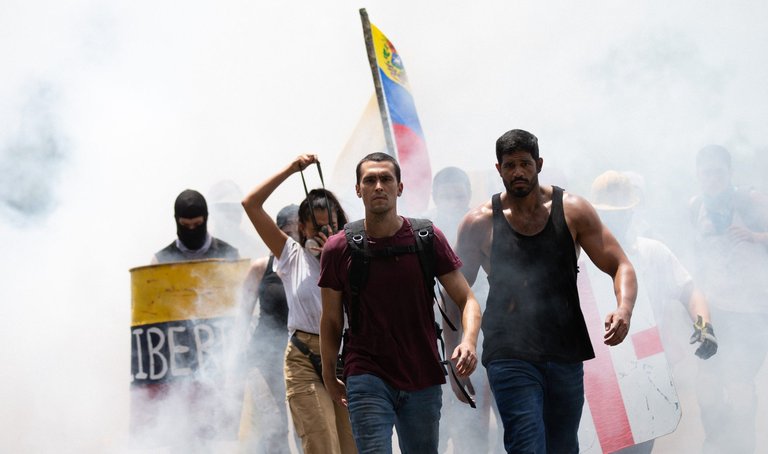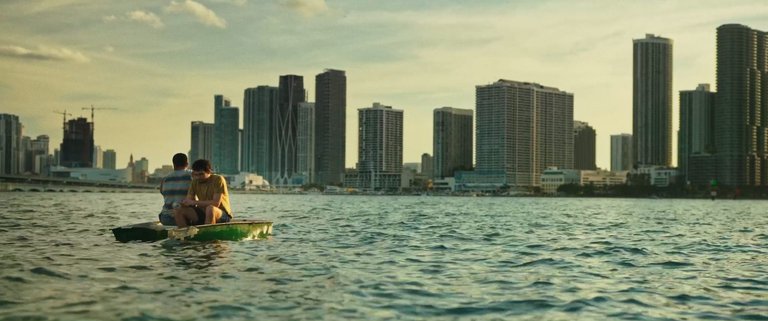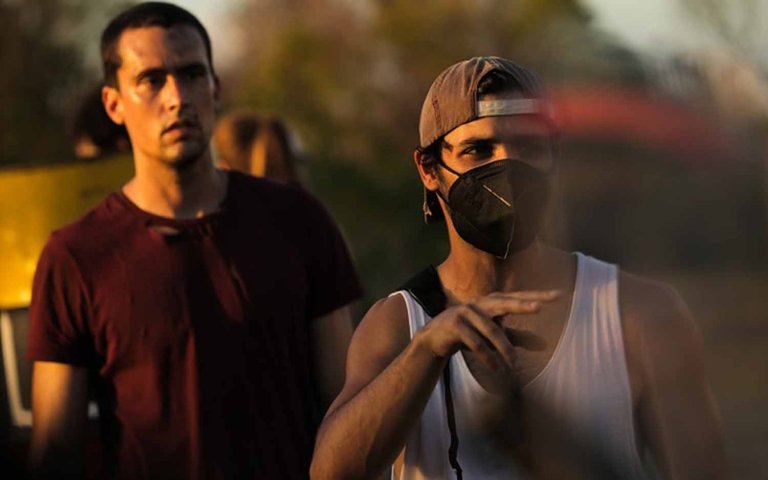Why this film shows the need to remember a country's problems (ENG-ESP)

ENGLISH
Behind every generalization, there is a grain of truth. Still, the prejudice against Venezuelan cinema is partially due to the fact that Venezuelans seek of entertainment to escape from the problems of everyday life, and Hollywood movies are usually the best option.
It is well-known that Venezuela lacks a robust film industry. There are numerous reasons for this, and it is unnecessary to delve deeply into them, as the economic, political, and social crisis that the country has been experiencing for years is enough to explain it. However, this does not justify the dismissal of talented individuals willing to tell stories amidst weariness and even disdain towards Venezuelan cinema, which, according to public opinion, is solely focused on producing films that depict misery.
Nevertheless, the film "Simon" (2023), Diego Vicentini's debut feature, reminds us of the events that took place in 2014 when the opposition and civil society, utilizing university students, protested against the government of Nicolás Maduro. During these protests, 43 people lost their lives, and to this day, their cases remain unsolved. Years later, the protests continued, resulting in more deaths at the hands of state officials and under mysterious circumstances.

The story revolves around Simón, a young leader of the student movement who is willing to sacrifice everything to liberate the country from the crisis caused by political policies and corruption within the government. Simón and his friends are kidnapped by the government to be tortured and suppress the protest.
In that process, the character manages to escape and seek asylum in the United States but to obtain it, he must pay the price of never returning to Venezuela as long as the same regime that persecutes him persists.
Simón must make the difficult decision amidst the guilt of abandoning his friends, who continue to suffer the crisis.

The film is told through a parallel montage between the moments of his kidnapping, showing the methods of torture, and those of his stay in the United States, where he works as a dishwasher, starting from scratch. The contrast between the past and the present shows the transformation of an energetic, passionate, and vehement Simón to a taciturn, traumatized, and resigned Simón.
In the climax, both moments come together, and as if they were puzzle pieces, they are assembled to reach an emotional result.
This film addresses a sensitive issue for the Venezuelan population who experienced firsthand the protests, torture, persecution, and above all, evokes a dark period in contemporary history.
The protests have decreased. It is a fact that the government has won using coercion and populism, also thanks to the misguided and surrendering strategies of the opposition. These themes are subtly addressed throughout the film, implying that there is no partisan connotation.

The character is a living example of defeat. His resignation reflects the situation of many Venezuelans who have chosen to stay amidst contradictory despair and optimism or to flee like him, with all that being a migrant entails.
Time has passed, and memory is short. There is talk of economic recovery, but the facts say otherwise.
It is true that a film will not change the reality of a country, and it is not its purpose either, but to captivate and move, something that Simón achieves despite some criticisms that are not the focus of this text.
The truth is that in Venezuela, there is no rule of law. And this must not be forgotten.
PD: If you want to watch the movie, please click here. And by the way, this is the teaser.
ESPAÑOL
Detrás de toda generalización hay un ápice de verdad, pero el prejuicio hacia el cine venezolano, en parte se debe a que el público quiere entretenerse para olvidar los problemas del día a día, y las películas de Hollywood suelen ser la mejor opción.
Para nadie es un secreto que en Venezuela no hay una sólida industria cinematográfica. Razones hay muchas, y no es necesario profundizarlas, porque solo basta con recordar la crisis económica, política y social que atraviesa el país desde hace años. Sin embargo, esto no ratifica la carencia de talentos dispuestos a contar historias en medio del hartazgo e incluso, desdén, cuando según la opinión pública, el cine hecho en este país, solo refleja la miseria.
No obstante, el film Simon (2023), ópera prima de Diego Vicentini, invita a recordar los sucesos de 2014, cuando la oposición y la sociedad civil, utilizando a estudiantes universitarios, se levantaron en protesta en contra del Gobierno de Nicolás Maduro, donde murieron 43 personas, cuyos casos hasta el sol de hoy no han sido resueltos. Años posteriores las protestas persistieron, y fallecieron más a manos de funcionarios del Estado, y otras de manera misteriosa.

La historia es protagonizada por Simón, un joven líder del movimiento estudiantil dispuesto a dar todo para liberar al país de la crisis, producto de políticas y corrupción. Tanto él como sus amigos son secuestrados por el Gobierno para torturarlos y quebrar la protesta.
En ese proceso, el personaje lograr salir y busca asilo en Estados Unidos, pero para obtenerlo debe pagar por el precio de nunca volver a Venezuela mientras el régimen que lo persigue, siga ostentando el poder.
Simón debe tomar la difícil decisión en medio de la culpa culpa por abandonar a sus amigos, quienes siguen padeciendo la crisis
La película es contada en un montaje paralelo entre los momentos de su secuestro, mostrando los métodos de tortura, y los de su estadía en Estados Unidos, donde trabaja como lavaplatos, empezando desde cero. El contraste entre pasado y presente muestra el cambio de un Simón enérgico, apasionado y vehemente, a un Simón taciturno, traumado y resignado.

En el clímax ambos tiempos se unen, y como si se tratara de piezas, el rompecabezas se va armando para dar con un resultado emotivo.
Este film aborda un tema sensible para la población venezolana que vivió en carne propia las protestas, las torturas, la persecusión, y sobretodo, evoca un oscuro período de la historia contemporánea.
Las protestas disminuyeron. Es un hecho que el Gobierno ganó utilizando la coacción y el populismo. También gracias a las desacertadas y entreguistas estrategias de la oposición.
De manera sútil estos temas son abordados a lo largo de la película, dando a entender que no hay una connotación partidaria.
El personaje es el vivo hecho de la derrota. Su resignación es el reflejo de muchos venezolanos, que han optado por quedarse en medio de la contradictoria desesperanza y optimismo, o de huir como él, con todo lo que implica ser un migrante.
El tiempo ha pasado, y la memoria es corta. Se habla de recuperación económica, pero los hechos dicen lo contrario.
Es cierto que una película no va a cambiar la realidad de una país, y tampoco es su cometido, sino el de cautivar y emocionar, algo que Simón logra pese a algunas críticas que no son objeto de este texto.
Lo cierto es que en Venezuela no hay Estado de derecho. Y esto, no se debe olvidar.
PD: Si quieres ver la película,dale clic aquí. Por cierto, este es el teaser.
!discovery 45
This post was shared and voted inside the discord by the curators team of discovery-it
Join our Community and follow our Curation Trail
Discovery-it is also a Witness, vote for us here
Delegate to us for passive income. Check our 80% fee-back Program
Necesito fuerzas para ver esta película . Por los momentos la he evadido. Cuando me sienta preparado lo hare y publicare mi opinión.
Por favor déjame saber tu opinión. Mucha gente en la sala se quedó sentada callada luego de los créditos.
Normalmente las películas de Venezuela si no hay drogas prostitutas y malandros no es famosa Pero esto parece que demuestra lo contrario.
El cine venezolano es diverso, no solo esta película es un ejemplo.